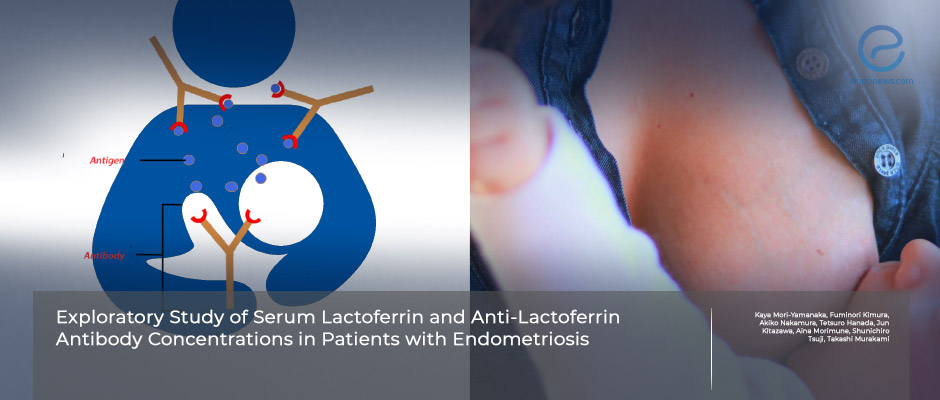Antiinflammatory lactoferrin molecule and antibody levels in endometriosis patients
Mar 29, 2023
A pioneering study shows decreased levels of serum lactoferrin and increased levels of anti-lactoferrin antibody in endometiosis.
Key Points
Highlights:
- Lactoferrin, a glycoprotein in mucosal secretions and milk, inhibits inflammatory substance synthesis, oxygen radical formation, and complement activation. Endogenous inhibition of neutrophil extracellular trap formation "NET" has also been attributed to lactoferrin molecules.
- Lactoferrin and anti-lactoferrin antibodies may have antagonistic functions concerning chronic inflammation, and autoimmune diseases. Neutrophils and macrophages are present in endometriotic foci and also NET formation is increased in ascites and peripheral blood of endometriosis patients.
Importance:
- Lactoferrin and anti-lactoferrin antibodies may have a role in endometriosis patients since this disease has a disturbed immune system besides their associaton with several autoimmune diseases.
What's done here:
- The study includes 51 endometriosis and 17 control patients at the Shiga University of Medical Science Hospital, Japan.
- The serum lactoferrin and anti-lactoferrin levels were compared between the endometriosis and non-endometriosis groups.
- Their differences were compared among the non-endometriosis, early-stage endometriosis (I + II), and advanced stages endometriosis (III + IV) groups using statistical methods.
Key Results:
- Significantly higher levels of anti-lactoferrin antibodies were found in patients with endometriosis.
- A decrease in serum anti-lactoferrin antibody levels following surgical endometriosis resections was also remarkable.
Limitations:
- The control group can not be denied as disease-free for endometriosis.
Lay Summary
A Japanese clinical research team led by Dr. Kaya Mori-Yamanaka from Shiga University of Medical Science Hospital, Otsu, Shiga, Japan, published their pioneering study on the role of serum lactoferrin and anti-lactoferrin antibody levels in endometriosis in a recent issue of Tohoku Journal of Experimental Medicine.
Lactoferrin is a single-chain glycoprotein found in human mucosal secretions and milk having well-known anti-inflammatory effects. Besides inhibiting inflammatory substance synthesis, oxygen radical formation, and complement activation, lactoferrin also inhibits endogenous neutrophil extracellular trap formation "NET".
As a chronic inflammatory disease, endometriotic foci have neutrophils and macrophages and NET formation is increased in ascites and peripheral blood of endometriosis patients. Though endometriosis has not been categorized as an autoimmune disease, this disordered immune system is sometimes linked to several autoimmune diseases.
The above facts have caused enthusiasm in searching lactoferrin and anti-lactoferrin antibody status in endometriosis patients.
As a unique pioneering research involving 51 endometriosis and 17 control patients at the Shiga University of Medical Science Hospital, Japan, serum lactoferrin and anti-lactoferrin levels were measured, and their differences were compared among the non-endometriosis, early-stage endometriosis (I + II), and advanced stages endometriosis (III + IV) groups using statistical analytical methods. This study included only patients with surgeries and excluded clinical endometriosis diagnosed by ultrasound findings or other means.
The serum lactoferrin and anti-lactoferrin levels were significantly higher in the endometriosis group than in the non-endometriosis group. A significant difference was also found in the serum lactoferrin levels between the advanced-stage endometriosis (III + IV) and non-endometriosis groups. No significant difference was found in the serum anti-lactoferrin antibody level among the early-stage endometriosis (I + II), advanced-stage endometriosis (III + IV), and non-endometriosis groups.
The authors emphasize that this is a pioneering first report of an association of endometriosis with serum lactoferrin and anti-lactoferrin antibody levels. The pathogenetic pathways that elevated antibody levels in patients with endometriosis and their effect on illness should be investigated.
Research Source: https://pubmed.ncbi.nlm.nih.gov/36476585/
endometriosis lactoferrin anti-lactoferrin antibody autoimmune disease

